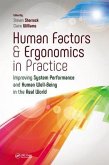- Broschiertes Buch
- Merkliste
- Auf die Merkliste
- Bewerten Bewerten
- Teilen
- Produkt teilen
- Produkterinnerung
- Produkterinnerung
Human error is cited over and over as a cause of incidents and accidents. This book takes you behind the human error label. It begins by summarising the most significant research results. It explores how a changing understanding of accidents and an embracing of systems thinking has radically impacted ideas about human error.
Andere Kunden interessierten sich auch für
![Human Factors and Ergonomics in Practice Human Factors and Ergonomics in Practice]() Human Factors and Ergonomics in Practice59,99 €
Human Factors and Ergonomics in Practice59,99 €![The Safety Anarchist The Safety Anarchist]() Sidney DekkerThe Safety Anarchist40,99 €
Sidney DekkerThe Safety Anarchist40,99 €![Managing Maintenance Error Managing Maintenance Error]() James ReasonManaging Maintenance Error59,99 €
James ReasonManaging Maintenance Error59,99 €![Talking Health, Safety and Wellbeing Talking Health, Safety and Wellbeing]() Tim MarshTalking Health, Safety and Wellbeing40,99 €
Tim MarshTalking Health, Safety and Wellbeing40,99 €![Human Performance on the Flight Deck Human Performance on the Flight Deck]() Don HarrisHuman Performance on the Flight Deck61,99 €
Don HarrisHuman Performance on the Flight Deck61,99 €![Human Factors Methods Human Factors Methods]() Neville A. StantonHuman Factors Methods87,99 €
Neville A. StantonHuman Factors Methods87,99 €![Technology, Human Performance, and Nuclear Facilities Technology, Human Performance, and Nuclear Facilities]() Jonathan K. CorradoTechnology, Human Performance, and Nuclear Facilities55,99 €
Jonathan K. CorradoTechnology, Human Performance, and Nuclear Facilities55,99 €-
-
-
Human error is cited over and over as a cause of incidents and accidents. This book takes you behind the human error label. It begins by summarising the most significant research results. It explores how a changing understanding of accidents and an embracing of systems thinking has radically impacted ideas about human error.
Produktdetails
- Produktdetails
- Verlag: Taylor & Francis Ltd
- 2 ed
- Seitenzahl: 292
- Erscheinungstermin: 28. August 2010
- Englisch
- Abmessung: 233mm x 154mm x 22mm
- Gewicht: 440g
- ISBN-13: 9780754678342
- ISBN-10: 0754678342
- Artikelnr.: 32956610
- Verlag: Taylor & Francis Ltd
- 2 ed
- Seitenzahl: 292
- Erscheinungstermin: 28. August 2010
- Englisch
- Abmessung: 233mm x 154mm x 22mm
- Gewicht: 440g
- ISBN-13: 9780754678342
- ISBN-10: 0754678342
- Artikelnr.: 32956610
David D. Woods, Ph.D. is Professor at Ohio State University in the Institute for Ergonomics and Past-President of the Human Factors and Ergonomics Society. He was on the board of the National Patient Safety Foundation and served as Associate Director of the Veterans Health Administration's Midwest Center for Inquiry on Patient Safety. He received a Laurels Award from Aviation Week and Space Technology (1995). Together with Erik Hollnagel, he published two books on Joint Cognitive Systems (2006). Sidney Dekker is Professor and Director of the Key Centre for Ethics, Law, Justice and Governance at Griffith University in Brisbane, Australia. Previously Professor at Lund University, Sweden, and Director of the Leonardo Da Vinci Center for Complexity and Systems Thinking there, he gained his Ph.D. in Cognitive Systems Engineering from The Ohio State University, USA. He has worked in New Zealand, the Netherlands and England, been Senior Fellow at Nanyang Technological University in Singapore, Visiting Academic in the Department of Epidemiology and Preventive Medicine, Monash University in Melbourne, and Professor of Community Health Science at the Faculty of Medicine, University of Manitoba in Canada. Sidney is author of several best-selling books on system failure, human error, ethics and governance. He has been flying the Boeing 737NG part-time as airline pilot for the past few years. The OSU Foundation in the United States awards a yearly Sidney Dekker Critical Thinking Award. Richard Cook, M.D. is an active physician, Associate Professor in the Department of Anesthesia and Critical Care, and also Director of the Cognitive Technologies Laboratory at the University of Chicago. Dr. Cook was a member of the Board of the National Patient Safety Foundation from its inception until 2007. He counts as a leading expert on medical accidents, complex system failures, and human performance at the sharp end of these systems. Among many other publications, he co-authored A Tale of Two Stories: Contrasting Views of Patient Safety. Leila Johannesen, Ph.D. works as a human factors engineer on the user technology team at the IBM Silicon Valley lab in San Jose, CA. She is a member of the Silicon Valley lab accessibility team focusing on usability sessions with disabled participants and accessibility education for data management product teams. She is author of The Interactions of Alicyn in Cyberland (1994). Nadine Sarter, Ph.D. is Associate Professor in the Department of Industrial and Operations Engineering and the Center for Ergonomics at the University of Michigan. With her pathbreaking research on mode error and automation complexities in modern airliners, she served as technical advisor to the Federal Aviation Administration's Human Factors Team in the 1990's to provide recommendations for the design, operation, and training for advanced 'glass cockpit' aircraft and shared the Aerospace Laurels Award with David Woods.
I: An Introduction to The Second Story
1: The Problem With "Human Error"
2: Basic Premises
II: Complex Systems Failure
3: Linear and Latent Failure Models
4: Complexity, Control and Sociological Models
5: Resilience Engineering
III: Operating at The Sharp End
6: Bringing Knowledge to Bear in Context
7: Mindset
8: Goal Conflicts
IV: How Design Can Induce Error
9: Clumsy Use of Technology
10: How Computer-Based Artifacts Shape Cognition and Collaboration
11: Mode Error in Supervisory Control
12: How Practitioners Adapt to Clumsy Technology
V: Reactions to Failure
13: Hindsight Bias
14: Error as Information
15: Balancing Accountability and Learning
16: Summing Up: How to go Behind The Label "Human Error"
1: The Problem With "Human Error"
2: Basic Premises
II: Complex Systems Failure
3: Linear and Latent Failure Models
4: Complexity, Control and Sociological Models
5: Resilience Engineering
III: Operating at The Sharp End
6: Bringing Knowledge to Bear in Context
7: Mindset
8: Goal Conflicts
IV: How Design Can Induce Error
9: Clumsy Use of Technology
10: How Computer-Based Artifacts Shape Cognition and Collaboration
11: Mode Error in Supervisory Control
12: How Practitioners Adapt to Clumsy Technology
V: Reactions to Failure
13: Hindsight Bias
14: Error as Information
15: Balancing Accountability and Learning
16: Summing Up: How to go Behind The Label "Human Error"
I: An Introduction to The Second Story
1: The Problem With "Human Error"
2: Basic Premises
II: Complex Systems Failure
3: Linear and Latent Failure Models
4: Complexity, Control and Sociological Models
5: Resilience Engineering
III: Operating at The Sharp End
6: Bringing Knowledge to Bear in Context
7: Mindset
8: Goal Conflicts
IV: How Design Can Induce Error
9: Clumsy Use of Technology
10: How Computer-Based Artifacts Shape Cognition and Collaboration
11: Mode Error in Supervisory Control
12: How Practitioners Adapt to Clumsy Technology
V: Reactions to Failure
13: Hindsight Bias
14: Error as Information
15: Balancing Accountability and Learning
16: Summing Up: How to go Behind The Label "Human Error"
1: The Problem With "Human Error"
2: Basic Premises
II: Complex Systems Failure
3: Linear and Latent Failure Models
4: Complexity, Control and Sociological Models
5: Resilience Engineering
III: Operating at The Sharp End
6: Bringing Knowledge to Bear in Context
7: Mindset
8: Goal Conflicts
IV: How Design Can Induce Error
9: Clumsy Use of Technology
10: How Computer-Based Artifacts Shape Cognition and Collaboration
11: Mode Error in Supervisory Control
12: How Practitioners Adapt to Clumsy Technology
V: Reactions to Failure
13: Hindsight Bias
14: Error as Information
15: Balancing Accountability and Learning
16: Summing Up: How to go Behind The Label "Human Error"








